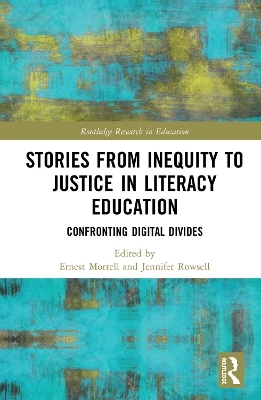
Stories from Inequity to Justice in Literacy Education
Routledge (Verlag)
978-0-367-03111-4 (ISBN)
Drawing on research studies from around the globe, Stories from Inequity to Justice in Literacy Education identifies social, economic, racial, political and geographical factors which can limit populations’ access to technology, and outlines the negative impact this can have on literacy attainment. Reflecting macro, meso and micro inequities, chapters highlight complex issues surrounding the productive use of technology and the mobilization of multimodal texts for academic performance and illustrate how digital divides might be remedied to resolve inequities in learning environments and beyond.
Contesting the digital divides which are implicitly embedded in aspects of everyday life and learning, this text will be of great interest to researchers and post-graduate academics in the field of literacy education.
Jennifer Rowsell is the Canada Research Chair in Multiliteracies at Brock University, Canada. Ernest Morrell is the Coyle Professor of Literacy Education and the Director of the Notre Dame Center for Literacy Education at the University of Notre Dame, USA.
Chapter 1 - Introduction: Moving stories of inequity to stories of justice
Jennifer Rowsell, University of Bristol, UK & Ernest Morrell, University of Notre Dame, USA
Section 1: Macro perspectives: Big gaps, divides, and inequities
Chapter 2 - Searching for mermaids: Access, capital and the digital divide in a rural South African Primary School
Kerryn Dixon, University of the Witwatersrand, South Africa
Chapter 3 - Divided digital practices: A story from Indigenous Australia
Inge Kral, The Australian National University, Australia
Chapter 4 - Storylines: Young people playing into change in agricultural colleges in Rural Ethiopia to address sexual and gender based violence
Hani Sadati, Claudia Mitchell & Lisa Starr, McGill University, Canada
Section 2: Meso perspectives: Making it work on the margins
Chapter 5 - Reframing the digital in literacy: Youth, arts, and misperceptions
Mia Perry, University of Glasgow, UK, Diane R. Collier, Brock University, Canada & Jennifer Rowsell, University of Bristol, UK
Chapter 6 - The potential of participatory literacies to challenge digital (civic) divides Nicole Mirra, Rutgers University, USA & Antero Garcia, Stanford University, USA
Chapter 7 - Youth people’s media use and social participation in Hong Kong: A perspective of digital use divide
Alice Y. L. Lee, Hong Kong Baptist University, China & Klavier J. Wang, The Education University of Hong Kong, China
Chapter 8 - From mothballed to meaningfully-used technology in Urban Catholic Schools
Nate Wills, University of Notre Dame, USA
Section 3: Micro perspectives: Race and social class digital divides in communities
Chapter 9 - Social class, literacies, and digital wastelands: Technological artifacts in a network of relations
Stephanie Jones & Jaye Johnson Thiel, University of Georgia, USA
Chapter 10 - Values, neoliberalism, and the digital divide: Nonwhite media makers and the production of meaning
Zithri Saleem & Negin Dahya, University of Washington, USA
Chapter 11 - Making it work in the Global South: Stories of digital divides in a Brazilian context
Cristiane Manzan Perine, Federal University of Uberlândia, Brazil & Jennifer Rowsell, University of Bristol, UK
Afterword
| Erscheinungsdatum | 26.07.2019 |
|---|---|
| Reihe/Serie | Routledge Research in Education |
| Zusatzinfo | 4 Tables, black and white; 9 Halftones, black and white; 9 Illustrations, black and white |
| Verlagsort | London |
| Sprache | englisch |
| Maße | 152 x 229 mm |
| Gewicht | 453 g |
| Themenwelt | Sozialwissenschaften ► Pädagogik ► Bildungstheorie |
| Sozialwissenschaften ► Pädagogik ► Schulpädagogik / Grundschule | |
| ISBN-10 | 0-367-03111-6 / 0367031116 |
| ISBN-13 | 978-0-367-03111-4 / 9780367031114 |
| Zustand | Neuware |
| Haben Sie eine Frage zum Produkt? |
aus dem Bereich


